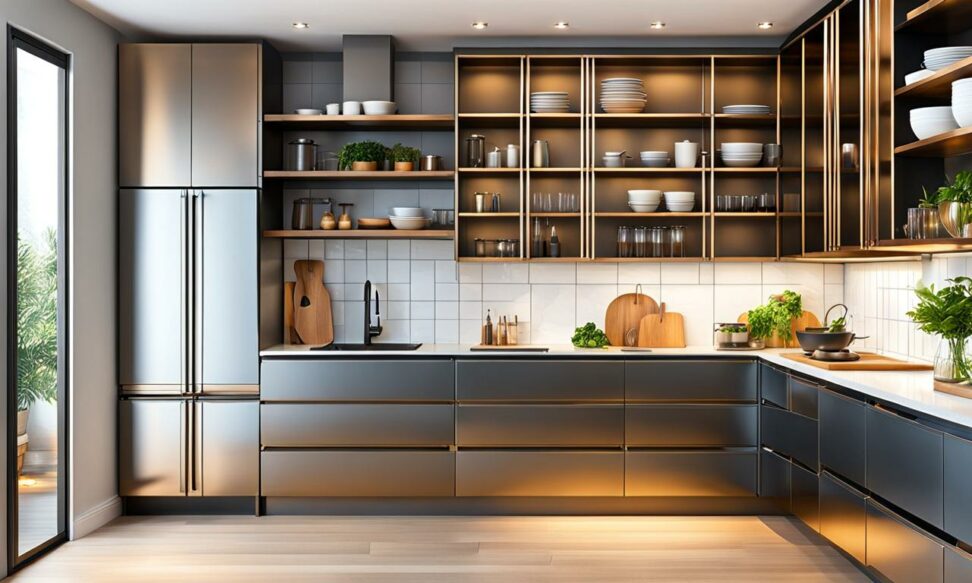The Complete Guide to Choosing the Best Metal Shelves for Your Kitchen
With so many options for metal kitchen shelves, it can be tricky to decide which type best fits your space and storage needs. This comprehensive guide takes you through all the factors to consider when selecting metal shelving, from materials and capacity to style and installation.
We'll explore the unique benefits of metal shelves as well as the pros and cons of different types like stainless steel, wire, and galvanized. You'll learn how to choose the right size and mounting method for your kitchen layout. Read on for tips to maximize organization and achieve an uncluttered aesthetic using stylish metal storage.
Factors to Consider When Choosing Metal Shelving
Metal shelves come in a range of shapes, sizes and styles. Before shopping, take into account:

Kitchen Layout and Dimensions
Carefully measure the length, width and height of your available wall space or floor area for shelves. Consider the placement of existing cabinets, appliances and your kitchen workflow patterns when deciding where to install shelving.
Weight Capacity Needs
Review the weight limits of any models you're considering, which vary based on material thickness and reinforcement. Account for the mass of dishes, cookware, appliances, canned goods and other items you intend to organize.
Storage Needs and Organization
How will you categorize items? Maximize vertical real estate for overflow items, then designate shelves for everyday dishes and glassware, cooking/baking essentials, food staples, small appliances and more.
Style Preferences
Are you looking for an industrial, modern aesthetic with stainless steel? Or do you prefer a vintage vibe with galvanized metal? This will inform your material and design choices.
Best Materials for Metal Kitchen Shelving
Metal shelves come in a variety of materials - consider the pros and cons of each:
Stainless Steel Shelving
Sleek and easy to clean, stainless steel shelves are extremely durable. However, they come at a higher price point and fingerprints can stand out.
Chrome Wire Shelving
Affordable and lightweight, wire shelves promote air circulation and visibility. But they lack the sturdy feel and strength of solid metal units.
Galvanized Steel Shelving
With vintage styling, galvanized steel brings personality at budget pricing. But it's prone to rust over time and can be quite heavy.
Key Considerations for Shelf Types
Beyond the material, shelf configuration matters too:
Wall-Mounted Shelving
Stud mounting is crucial to support weight. Go for adjustable height and depth. Just know wall shelves are fixed in place once installed.
Freestanding Shelving
Caster wheels allow you to roll shelves around your floor space. Anti-tip kits boost stability. But they do take up precious floor real estate.
Getting the Right Fit For Your Kitchen
A few measuring tips for choosing shelf dimensions:
- For wall shelves, measure the exact area available rather than the whole wall length.
- Allow for some growth - collections often expand over time.
- Don't overlook vertical storage above cabinets or the refrigerator.
Achieving an Organized, Clutter-Free Kitchen
Once installed, apply these strategies to keep shelves orderly:
- Categorize like items together - mugs with mugs, spices with spices.
- Label shelves clearly so items get returned properly.
- Edit frequently - get rid of excess or unused items.
Beyond organization, metal shelving introduces eye-catching style. Try:
- Mixing metal shelves with wooden elements for contrast
- Painting shelves for a pop of color
- Accessorizing with plants, cookbooks and decor
- DIY-ing custom shelves that fit your space perfectly
With all the options for stylish and functional metal kitchen shelves, you're sure to find the perfect solution for your storage needs and style. Use this guide to make an informed decision you'll enjoy for years to come.